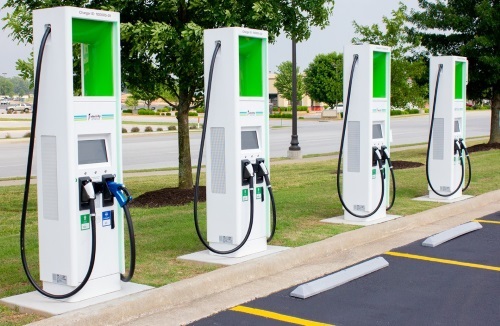Six energy utility companies are joining forces to build a seamless network of electric vehicle or EV charging stations connecting major highway systems from the Atlantic Coast, through the Midwest and South, and into the Gulf and Central Plains regions.
[Above photo of EV recharging station by Walmart.]
The Electric Highway Coalition – made up of American Electric Power or AEP, Dominion Energy, Duke Energy, Entergy Corporation, Southern Co., and the Tennessee Valley Authority – plans to establish a network of direct current or DC “fast chargers” within their service territories that can repower a typical EV in 20 to 30 minutes.
Nicholas Akins, AEP’s chairman, president, and CEO said in a statement that this effort will provide drivers with “effective, efficient, and convenient charging options” that enable long-distance EV travel, with the coalition also considering recharging sites along major highway routes with easy highway access and amenities for travelers.
“Throughout the ages, travelers have had to figure out how to get from point A to B. From feeding and watering horses to filling gas tanks, and now recharging batteries, ensuring that there are convenient places to accomplish these tasks is critical,” he said. “With this effort, we are working to help drivers see that EVs fit their lifestyle and their travel plans, wherever the road might take them.”
Several state departments of transportation are also engaged in similar build-out efforts to establish networks of EV rechargers along major highways.
For example, the California Department of Transportation – known as Caltrans – recently finished installing 22 new “fast-charging” EVs stations at nine locations along the state’s highway network.
The agency said the 22 Level 3 DC fast chargers deployed as part of this $4.5 million project provide an approximate 80 percent charge in 30 minutes to EVs with fast-charging capability. The units also feature “universal connectors” so they can re-charge all EVs on the market, including Teslas, with an adapter. Charging is free with no time limit, Caltrans added.
In September 2020, the Rhode Island Department of Transportation began providing free access to EV recharging stations situated at two of its park and ride commuter lots as part of a pilot program to encourage and support the broader use of EVs across the state. And in July 2020, DriveOhio – a division of the Ohio Department of Transportation – outlined a new statewide strategy to help expand statewide EV use in an Electric Vehicle Charging Study, which recommended building EV charging stations at least every 50 miles at specific locations along interstate, state, and U.S. route corridors.

